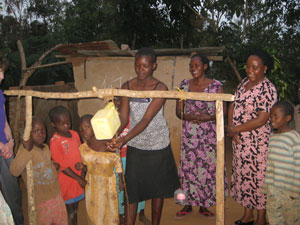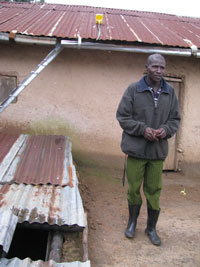Uganda
In Uganda, WASHplus works in the districts of Kisoro, Kabale, and Kanungu to strengthen the capacity of USAID implementing partners—SPRING, Community Connector, STAR-SW, among others—to integrate WASH into both nutrition and HIV activities. In these communities access to water is a burden borne by women and children who carry small buckets or jerry cans to distant water points over difficult terrain. What a difference a water-saving tippy tap hand washing station or a rain catchment system can make—examples of small doable approaches that WASHplus promotes. 
Coordinating with the USAID Strengthening Decentralization for Sustainability (SDS) project, WASHplus also assists the three districts in planning, budgeting, implementing, and monitoring USAID-funded WASH improvement grants. With WASHplus support all three districts are implementing a range of WASH activities: managing menstrual hygiene and installing institutional latrines as part of introducing the WASH-Friendly School concept, ending open defecation through community-led total sanitation (CLTS) and sanitation marketing, and addressing water shortages through do-it-yourself (DIY) household rainwater harvesting.
WASHplus technical support also includes hosting workshops to bring together district health inspectors, school inspectors, planners, community development officers, and financial and water officers and providing training to strengthen capacity on topics such as CLTS, why WASH matters for HIV and nutrition, inclusive sanitation, menstrual hygiene management and DIY menstrual pads, the small doable action approach, and coordinated planning and budgeting.
In addition WASHplus is building on the integration work of its predecessor project (USAID Hygiene Improvement Project) to strengthen USAID implementing partners with the same focus on integrating WASH into HIV programming, although the home-based care context is quite different in the southwest region where the focus is less on routine care and more clinical in nature. At the national level WASHplus works with USAID’s FANTA project to integrate WASH into Nutrition Assessment Counseling and Support policy and training, and with SPRING and others to roll out the guidance to the local level. 
Resources
Success Stories
- Menstrual Hygiene Management: Breaking the Secrecy, 2014. WASHplus partnered with the Strengthening TB and AIDS Response in South Western Uganda Project or STAR-SW, managed by the Elizabeth Glaser Pediatric AIDS Foundation, to pilot a campaign to teach youths living with HIV and their caretakers to safely and hygienically manage menstruation.
End of Project Review
- Improving WASH Behaviors to Reduce Diarrhea and Improve the Health and Resilience of Children, Families Affected by HIV/AIDS, and Other Vulnerable Populations: WASHplus Uganda End of Project Review, 2014 (pdf, 1.2MB). With funding from USAID/Uganda WASHplus worked for almost two years (January 2013–November 2014) to reduce diarrhea and improve the health and resilience of key populations in three districts— Kabale, Kisoro, and Kanungu.
WASH Practices - Assessment Cards (English and Two Local Languages)
- Assessment Cards (Rufumbira)(pdf, 677KB).
- Assessment Cards (Rukiga) (pdf, 677KB)
- Assessment Cards (English) (pdf, 677KB).
Job Aids (English and Two Local Languages
- Job Aids in Local Languages (Rufumbira)(pdf, 4MB).
- Job Aids in Local Languages (Rukiga) (pdf, 4MB).
- Job Aids (English) (pdf, 147KB)
Training
- Integrating Safe Water, Sanitation, and Hygiene into HIV Programmes: A Training and Resource Pack for Uganda, 2014 (pdf, 5MB).
- Integrating Safe Water, Sanitation, and Hygiene into Infant and Child Nutrition Programmes: A Training and Resource Pack for Uganda, 2014 (pdf, 8MB). The overall objective of this Resource Pack is to facilitate the training of village health teams (VHTs), community knowledge workers (CKWs), peer support groups (PSGs), and other outreach workers on how they can help household and community members to overcome, or change, the many daily obstacles to improved water, sanitation, and hygiene (WASH) practices in the home.
Uganda Stats in Brief
Population (x1000) - 2012
- 36,346
Water Access (improved source)
- 71% rural areas
- 95% urban areas
- 75% national total
Sanitation Access (improved facility)
- 33% rural areas
- 34% urban areas
- 34% national total
Source: UNICEF/WHO JMP 2014

